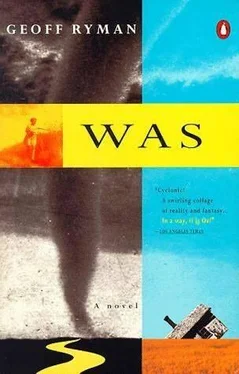Etta nodded.
"So are you," Dorothy decided. The long arms and the twisted trunk had resolved themselves into something neutral.
Etta went pink. "Don't talk nonsense," she said.
"You're real pretty. Are you married?"
Etta smiled a secret kind of smile. "I might be someday."
"Everybody should be married," said Dorothy. It appealed to her sense of order.
"Why's that?" Etta asked.
Dorothy shrugged. She didn't know. She just had a picture of people in houses. "Where do you live if you're not married?"
"With my Uncle William."
"Could you marry him?"
Etta chuckled. "I wouldn't want to. There is someone I could marry, though, if you promise not to tell anyone."
Dorothy nodded yes.
"Mr. Reynolds," whispered Etta, and her face went pink again, and she grinned and grinned.
Dorothy grinned as well, and good spirits suddenly overcame her. "Mr. Reynolds," Dorothy said, and kicked both feet.
"People tell me I shouldn't marry him. But do you know, I think I might just do it anyway."
Dorothy was pleased and looked at her white shoes and white stockings. "Now," said Etta. "What we're going to do is wait here till your aunty comes. And if she can't come here today, then we'll go and spend the night at my house and then go to your aunty's in the morning. Would you like that?"
Dorothy nodded yes. "Is it nice here?" she asked.
"Nice enough," said Etta. She told Dorothy about the trees of Manhattan. When the town was planned, every street had a row of trees planted down each side. The avenues had two rows of trees planted on each side, in case the road was ever widened. So, Manhattan was called the City of Trees. Dorothy liked that. It was as if it were a place where everyone lived in trees instead of houses. Nimbly, Etta packed up the remains of their dinner.
Then they went to the window. Dorothy saw Manhattan.
There was a white two-story house on the corner of the road, with a porch and a door that had been left open. Dorothy could hear a child calling inside. There was a smell of baking. It looked like home.
And there were the trees, as tall as the upper floor. Beyond the trees, there was a honey-colored building. The Blood Hotel, Etta called it. There were hills: Blue Mont with smoke coming out of its top like a chimney; College Hill, where Etta lived.
"Are there any Indians?" Dorothy asked.
Not anymore, Etta told her. But near Manhattan, there had been an Indian city.
"It was called Blue Earth," said Etta. "They had over a hundred houses. Each house was sixty feet long. They grew pumpkins and squash and potatoes and fished in the river, and once a year they left to hunt buffalo. They were the Kansa Indians, which is why one river is called the Kansas, and the other is called Big Blue. Because they met right here where the Kansas lived."
Dorothy saw it, a river as blue as the sea in her picture books at home. The Kansas River was called yellow, and Dorothy saw the two currents, yellow and blue mixing like colors in her paint box.
"Is it green there?" she asked. She meant where the blue and yellow mixed.
"It's green everywhere here," Etta answered. They went back to sit on the bench. Etta told Dorothy about Indian names, Wichita and Topeka. Topeka meant "A Good Place to Find Potatoes." That made Dorothy laugh.
"But any place is what you make it," said Etta. "You've got to make it home. You've got to do that for yourself. Do you understand what I'm saying?"
Dorothy began to play with the bows on Etta's dress. Etta put her arms around her and rested her head against Dorothy's. They were nearly the same height.
"It's difficult, because everybody wants to be loved. And you think you can't have a home unless you are loved by somebody, anybody. But it's not true. Sometimes you can learn to live without being loved. It's terrible hard, but you can do it."
Then she kissed Dorothy on the forehead.
"The trick is," said Etta, pulling Dorothy's long black hair from her face, "to remember what it's like to be loved."
Dorothy fell asleep. She dreamed of knitting and the black piano and her paint box and picture books and all the things that had been left behind.
"Dorothy. Dorothy, darling, wake up." Someone was speaking. Dorothy opened her eyes to see a woman's face. Her skin was brown; the lips looked bruised; the flesh around the eyes was dark. "Hello, Dorothy. I'm your Aunty Em."
Toto gave one fierce bark of alarm and wriggled his way back onto Dorothy's lap. Dorothy was confused and rubbed her eyes.
"She's tired," said another woman. Dorothy remembered who Etta was.
"Of course, it must have been a terrible odyssey for her. I was so sure she would be on the number five! Dorothy, are you all right?"
Dorothy nodded yes and slipped down from the bench. Aunty Em moved away from her. "Etta give me some chicken," explained Dorothy.
"And a great kindness that was! Why, Etta, you must have been here for hours!" Aunty Em had a face like a horse, strong and full of bone. She had huge gray teeth. She stood still, her attention fastened on Etta. Bloated with sleep, Dorothy was confused. Were they supposed to be going?
"It was no trouble," said Etta. "Johnson Langrishe told me she was here, and I remembered how I felt once upon a time." Etta glanced at Dorothy.
"All the way from College Hill," said Aunty Em, grabbing Etta's hand, her face crossed with concern. "In your condition."
Etta's smile went a bit stale. "My condition isn't so very delicate. I'd gone to market, it was easy for me to bring some food."
"The whole county knows how hard you work. Oh, Etta, I'd just love to set and talk, but we've got to get going before dark. Dorothy? Are you ready to go home?"
Dorothy solemnly nodded yes, she was.
"Well, then, come along. Etta, I'll give you a hand."
"I don't really need one," chuckled Etta.
"Of course not," said Aunty Em, but didn't let go. They walked toward the door.
My trunk, thought Dorothy, looking behind her. What was going to happen to her trunk? She saw her dresses folded inside it.
"Dorothy dear, come along."
"My trunk," said Dorothy and found that she was near tears.
"Oh!" said Aunty Em and put a hand across her forehead. "Yes, of course." She pushed open the door and called, "Henry? Henry, please to come and give our little girl a hand with her trunk?"
Aunty Em kept talking, standing in the doorway. "I was just saying to Henry the other day that we don't see enough of you good people out on the west side of the city." Aunty Em's smile blazed, her eyes were hooded. "How is your Uncle Isaac? We never see him these days, running the entire state of Kansas by himself it seems!"
There was a clumping of boots. Aunty Em stood aside for a terrible, looming man who walked past her without speaking.
"Miss Etta Parkerson, Henry," said Aunty Em, in a gentle, chiding voice.
The man had a long beard of varying lengths and his hair was plastered to his scalp, curling at the tips. He wore a somewhat striped shirt and an open vest with patches of food on it.
"Morn'," the man said. There was a distinct whiff of manure. Toto hopped up onto Dorothy's trunk to defend it. He began barking, bouncing in place.
"Here, dog," said Dorothy, so softly only Toto could hear. He came to her whining, and she picked him up and hugged him and buried her face in his fur. Uncle Henry grunted as he lowered her trunk to the floor.
"Out of the way, dear." As Dorothy turned, Aunty Em ushered her through the door. The very tip of her finger touched Dorothy's shoulder and then jumped back as if from a hot skillet.
Dorothy knew that Aunty Em had just remembered the Dip. She thought Dorothy carried disease. She didn't want to touch her.
And Dorothy, who wanted everything to be pretty, soft, full of lace, stood outside on the veranda and looked at the street and a rough, gray, unpainted wagon. Toto wriggled free and dropped to the floor of the porch. Etta pulled Dorothy to her and hugged her.
Читать дальше












